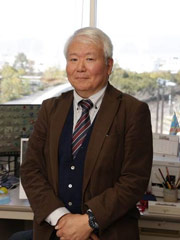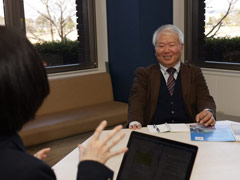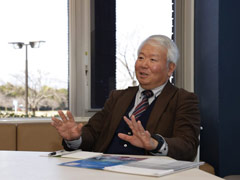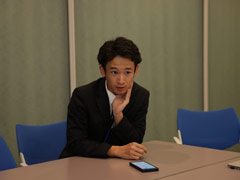
Name: Kiyoto Kurokawa
Affilitation: Professor at the Graduate School of Economics, Ritsumeikan University
Research field: Development economics / Regional economics / Disaster economics
At universities participating in individual programs (programs at each university) of the JICA Development Studies Program (JICA-DSP), JICA international students are offered courses on the development experiences of modern Japan (including Japan's own development and ODA cooperation with other countries). Professor Kiyoto Kurokawa, who is in charge of the programs at Ritsumeikan University, actively conducts field studies that allow students to learn about the processes of Japanese development in particular areas. We asked him about the characteristics of Ritsumeikan University's program and the significance of JICA-DSP.

Ritsumeikan University offers individual programs at the Graduate School of Economics, to which Prof. Kurokawa belongs, and at the Graduate School of International Relations. Five faculty members from both graduate schools, including Prof. Kurokawa, have worked at JICA and JICA Ogata Sadako Research Institute for Peace and Development. "We're all specialists with a strong interest in the issues faced by developing countries. Many international students who participate in JICA-DSP are practitioners who want to learn from Japanese development experiences and use them to contribute to the development of their own countries. I think it's a great advantage to be able to receive guidance from faculty members who have a wealth of experience in the field of development," the faculty members added.
The individual programs reflect the idea that "since the international students have come all the way to Japan, we want them to see the work in practice." The individual program offered by the Graduate School of Economics, at which Prof. Kurokawa teaches Applied Economics (Socio-Economic Survey), not only comprises lectures that teach social survey techniques, but also includes a field study to learn about community development in Nagahama City, Shiga Prefecture. In addition, the international students participate in study tours to visit various companies in Kyoto and Shiga, in high numbers. "Some of the world's largest companies are among the places we have visited, but these companies were very small at first. By actually visiting them and learning about the trajectory of their growth, I think that there are many things that start to make sense for the first time," says Prof. Kurokawa while emphasizing the significance of field studies.
At the same time, Prof. Kurokawa says, "There are many things that practitioners should learn in the field of research. Impartiality and objectivity are crucial when it comes to academic papers written in graduate school. You must submit evidence with appropriate citations and provide logical and persuasive explanations. These skills are essential to becoming a leading practitioner."
As a means to help students to acquire academic writing skills, they ask seniors who have returned home after studying in Japan to conduct seminars on master's thesis writing. "We get those with experience to provide guidance to their juniors who don't have experience in writing a master's thesis. I also ask them to talk about how they are applying their experience of writing a thesis to their practice," says Prof. Kurokawa. Sometimes they teach online from their home countries, and sometimes they come to Japan in person. Even after returning home, we can continue to communicate with them, which also provides them with opportunities to interact with their juniors.

Students are not the only ones who are inspired by JICA-DSP. Prof. Kurokawa says that it is also an opportunity for teachers to learn. He adds, "Even for professors who do not specialize in developing countries' research, accepting international students from all over the world is an opportunity to broaden their horizons in research areas that they haven't previously focused on." In the future, he would like to explain the significance of JICA-DSP to faculty and staff.
The impact is not limited to the university. It also inspires the corporations and municipalities that they visit during field studies. International students often ask questions regarding aspects that Japanese people don't really wonder about, because they take them for granted. "By receiving many questions from international students, companies and municipalities get the opportunity to learn from a new lens how valuable the development experiences of Japan are. I think JICA-DSP is a win-win program for everyone involved," says Prof. Kurokawa.

The individual programs and study tours are also attended by Japanese students who want to get a first-hand experience of development or take on business roles in developing countries. "One of the many great things about JICA-DSP is that students from different countries around the world come to Japan. Their command over the English language is different depending on their country, and there are also differences in their societies and lifestyles. Learning about the issues prevalent in various countries is also an opportunity to become aware of the issues that Japan faces. There are many Japanese students who are curious to learn more about developing countries by exploring diverse worlds that they could not have not imagined earlier," says Prof. Kurokawa.
We also asked Japanese students who actually attended the individual program to share their thoughts. Tota Takagi at the Graduate School of Economics, who also served as an interpreter during a study tour, decided to take the course because he wanted to study together with many international students. "I was able to simultaneously learn both the theory and the practice of development economics. I learned about the cooperative relationship between SMEs and developing countries for the first time, so I think my perspective was greatly broadened through exchanges with international students," he says. In the future, he is thinking about working in developing countries.
When he was an undergraduate student, Takagi was unaware of the existence of JICA-DSP. He adds, "I wasn't expecting so many JICA international students to have come to Ritsumeikan University. I'm sure there are many other students who are interested in an opportunity to interact with international students." He also talks about JICA-DSP to undergraduate students who are planning to advance to graduate school.